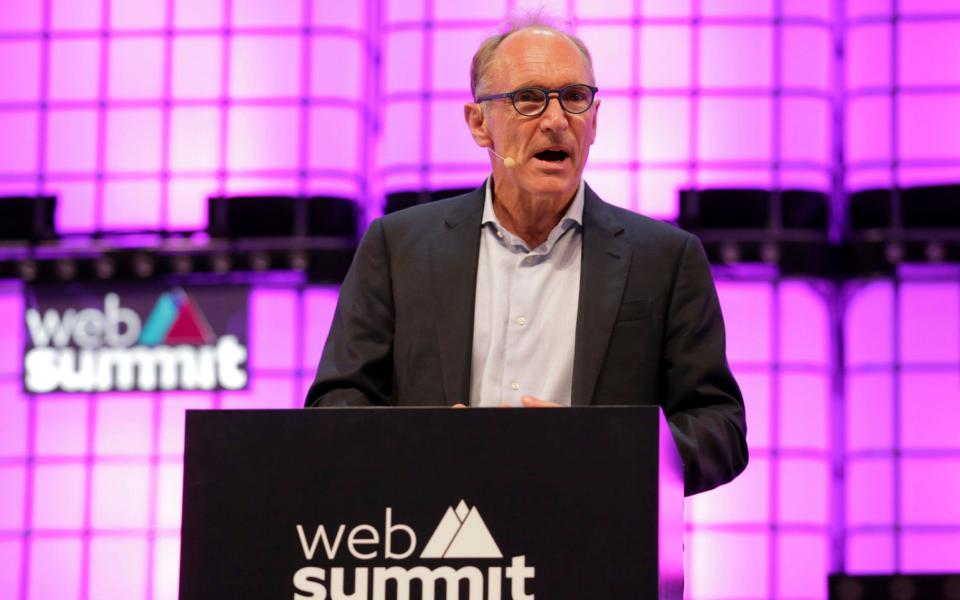The man who created the World Wide Web needs you to help fix it

LISBON—The inventor of the web isn’t happy with the state of the system he put online in 1991, and he wants you to help fix it.
In a keynote opening the Web Summit conference here Monday, Tim Berners-Lee announced “For The Web,” an effort to write a set of rules for how people, companies and governments should connect and communicate on the web.
But as a conversation with one of its architects at Berners-Lee’s World Wide Web Foundation revealed, this effort will also push people into making some complicated judgment calls. And protecting one ideal may require accepting compromises with another.
What’s gone wrong
Berners-Lee began his keynote on the conference’s opening night by admitting that his creation is falling short of his initial expectations.
“If you connect humanity with technology, then surely great things will happen,” he said. “We could keep it free and open, and people would do good things. What could go wrong?”
You can probably guess his answer: “Well, dur: All kind of things have gone wrong.” He ticked off such problems as privacy violations, online harassment and disinformation campaigns.
Berners-Lee said these problems are now slowing adoption of the web. While the amount of people worldwide who are online is expected to cross 50% next year, the growth rate of the world’s connected population is actually slowing.
His remedy for that starts with the Contract for the Web, a set of design and governance principles that by May 2019 should become a detailed list of policies and goals to which the private sector, the public sector and individual users can aspire and be held accountable.
“We need to make sure that, for the people who are connected to the web, that the web actually is a web that allows them to produce—it’s the web they want, it allows them to produce the world they want,” Berners-Lee said. “The idea is, everybody is responsible, going forward, for trying to make the web a better web in different ways.”
Commitments and possible conflicts
The contract’s nine principles come in threes: one set for governments, a second for companies and a third for everyday users.
It calls for governments to “Ensure everyone can connect to the internet,” “Keep all of the internet available” and “Respect people’s fundamental right to privacy.”
It asks companies to “Make the internet affordable and accessible to everyone,” “Respect consumers’ privacy and personal data” and “Develop technologies that support the best in humanity and challenge the worst.”
And it asks the rest of us to “Be creators and collaborators on the web,” “Build strong communities that respect civil discourse and human dignity” and “Fight for the web.”
Many of those ideals seem self-evident. But as Web Foundation CEO Adrian Lovett said in an interview Thursday, they can clash with each other.
Take, for instance, the privacy commitments. Asked for an example of a policy that met them, Lovett pointed to the European Union’s General Data Protection Regulation, calling it “very much in the right direction.”
But the GDPR also includes the EU’s “right to be forgotten” rule, which compels search sites to hide links that an EU resident finds embarrassing or obsolete in results to queries for their names—in fewer words, making less than all of the internet available.
“There are some areas where this is difficult,” he said.
Another tough call: deciding what minimum level of connectivity should be safe even for those who spew hate speech. If a commerce site like PayPal (PYPL) drops the racist social network Gab, should every other firm who provides every other level of access be able to shun it too?
Lovett called that “something we have to debate.”
Who’s for this
The contract will go nowhere without corporate and government backing, but it has begun to collect some. Signatories so far include Google (GOOG, GOOGL), Facebook (FB), Cloudflare and the government of France.
Private-sector activity may be more important in the near term, especially in the United States, where the Trump administration sees defending net neutrality as a low priority and a federal online-privacy law remains frustratingly far off.
Lovett voiced hope that in particular, social networks can take a careful look at how the mechanics of their services can feed asocial behavior. “At minimum, they don’t increase the volume and the reach of that kind of content,” he said. “And at best, they actually find tweaks and nudges that can minimize that impact.”
Monday’s keynote by Berners-Lee ended with a reminder of why we need to fix that. CNN correspondent Laurie Segall, who joined him onstage to interview him, recalled the recent attempted mail bombing of CNN’s New York building by a man radicalized online by extreme-right-wing propaganda.
“I feel like we’ve reached this point where a lot of you know, these clicks and swipes are turning into police sirens,” she said to Berners-Lee. “Tell us all: Do you think it’s gonna be okay?”
He offered a reassuring reply that people can change: “It’s gonna be okay, because these people are gonna step back and they’re going to put aside all of the myths that they’re currently taking as being just part of the physics of the way things work.”
But the web ecosystem, and all the distortions pushed into it by an economy driven by attention and ads, has had more than 25 years to calcify into its state.
(Disclosure: I moderated four panels here, in return for which the organizers covered most of my travel costs.)
More from Rob:
Why those chips in your credit cards don’t stop online fraud
What it’s like to use a search engine that’s more private than Google
Email Rob at rob@robpegoraro.com; follow him on Twitter at @robpegoraro.

 Yahoo Finance
Yahoo Finance 

